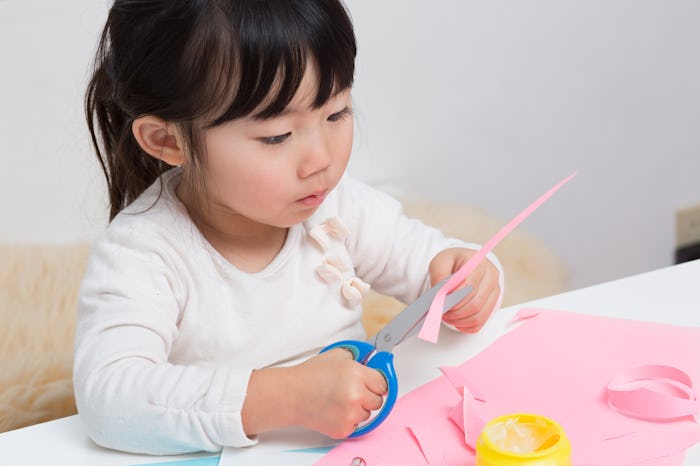Life

5 Things Your Child Should Know Before Going Into Preschool, According To Their Teacher
Even if it's just for the half day, sending your child off to school for the first time is nerve-wracking. The good news is that preschools exist to prepare your child for their next step, and the best ones don't take prior knowledge for granted. So if you're trying to figure out the things your child should know before going into preschool, you can rest easy. Romper spoke with Dr. Jennifer Jipson from The Goddard School’s Educational Advisory Board to learn more about preschool readiness, and you may be surprised to find that her guidelines have little to do with ABCs and 123s.
Jipson explains there are many definitions of readiness, and parental emphasis on content knowledge — colors and shapes, for example — is misplaced. So put those flashcards away: "What really matters are children's executive function skills ... and their learning dispositions."
She also wants parents to know it's not your child's job to get "ready" for preschool (or any level of early schooling), but rather, "it is the job of schools to be prepared to meet the needs of all children — despite vast individual differences in children's developing skills."
That said, emotional regulation and social skills can make a difference as your child takes their first steps into the academic world. So what skills should they have under their belt before their first day of preschool?
The Basics Of Self-Regulation
Social and emotional skills are absolutely critical for positive preschool experiences, according to Jipson. She notes that you can help your young child flex their social and emotional muscles by encouraging self regulation, or your child's ability to manage their emotions and behavior, which will help them focus when it's time to listen or learn. According to Virginia Commonwealth University, preschool teachers don't expect perfection here. It's a good idea to read to your child daily and discuss their emotions with them at an early age, but if your child isn't ready to sit through a medical school lecture just yet, don't stress. Jipson explains children learn self-regulation skills best in the context of quality childcare: "Trying to 'teach' these skills outside of an authentic motivation to learn them will not lead to success and may lead to frustration."
For that and many other reasons, it's more important to choose a preschool that's "ready" for your child, rather than lose sleep preparing your child for preschool. Parents Magazine offers great tips when it comes time to choose.
How To Use A Toilet (More Or Less)
"Preschool teachers expect to support young children as they become consistently 'toilet capable' (also known as potty training), but some degree of independence by 4 to 5 years of age is expected," Jipson notes. Parenting reported that some preschools have higher expectations than others, so be sure to ask about your preschool's potty policies in advance. Toilet training comes easily to some children and presents a steep challenge for others. Do what you can, but remember accidents happen (and no one knows that better than a good preschool teacher).
How To Be Curious
Can you teach your child to be curious? For more on that, check out Jonathan Mugan's excellent book, The Curiosity Cycle. In the meantime, Jipson explains that your child's disposition towards learning — their curiosity, motivation, and persistence — are the best things they can bring with them on their first day. So don't sit your child down with workbooks and a pencil now that school is looming. Instead, take them to a park, the zoo, or the aquarium. Children are naturally curious, and it's a joy to foster that bright spark. Throughout your child's scholastic career, parents should plan to support skills like initiative, persistence, and a desire to learn "as much or more than academic content," notes Jipson. Knowledge is one thing, but curiosity and the means to seek out knowledge will keep them learning their whole life.
The Concept Of Sharing
But actually, preschools don't really expect your child to know how to share. According to Jipson, a good preschool will focus instead on "supporting communication and respect others’ interests and learning ('ask her if you can have it when she’s done')." Sure, arrange some play dates this summer — it's great practice. But if your child's not ready to attend a state dinner yet, that's OK.
The truth is, your child doesn't really have to know a certain set of skills before preschool. According to Jipson, The Goddard School believes that "each child’s individual needs must be met to enable children to succeed and that curriculum must be adapted to the developmental level of each child for growth to occur." In other words, a good school understands and supports your child as an individual. Instead of drilling your child on their letters and numbers, use that time to get to know the schools near you. In the long run, selecting a high-quality preschool matters more than shapes and colors.